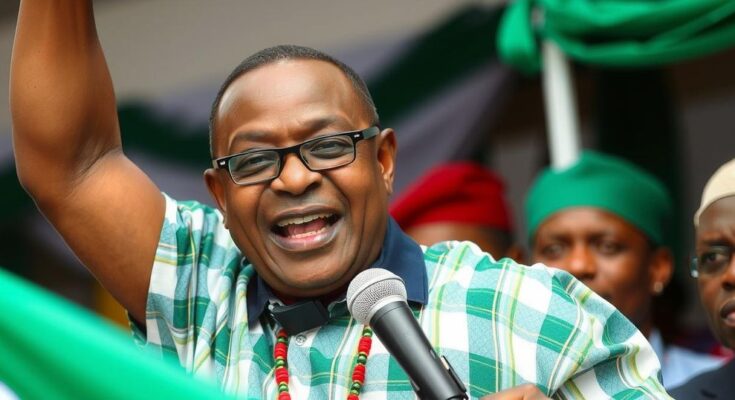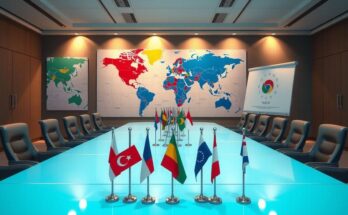John Dramani Mahama has won the Ghanaian presidential election held on December 7, as confirmed by outgoing Vice President Mahamudu Bawumia. This marks Mahama’s return to the presidency after previously serving from 2012 to 2017. His victory is attributed to widespread dissatisfaction with the ruling NPP, stemming largely from economic challenges facing the country. Despite some violence during the electoral process, the elections were largely peaceful, reflecting Ghana’s commitment to a stable democracy.
Former President John Dramani Mahama has emerged victorious in the Ghanaian presidential election held on December 7, with confirmation from outgoing Vice President Mahamudu Bawumia representing the ruling New Patriotic Party (NPP). Mahama, who previously served as President from July 2012 to January 2017, now returns to the nation’s highest office after being defeated in the 2016 and 2020 elections by former President Nana Akufo-Addo. Meanwhile, initial reports indicate that the National Democratic Congress (NDC), which Mahama represents, is leading in the parallel parliamentary elections, pending final results from the Independent Electoral Commission.
This electoral shift is attributed to the continuing economic challenges faced by Ghana, characterized by high inflation rates and escalating youth unemployment, factors that have swayed voters away from the incumbent government’s party. Mahama’s campaign focus on economic improvement resonates with the electorate’s desire for change, compounded by recent governmental scandals that have further eroded public trust. The newly elected President will face urgent financial challenges, including a $3 billion loan request made by the outgoing administration to the International Monetary Fund, which underscores the economic difficulties prevailing in the nation.
Historically, Ghana has been recognized for its political stability and adherence to democratic processes. Despite recent electoral cycles being marred by incidents of post-election violence, this year’s election presented a largely peaceful atmosphere. Nonetheless, it is important to note that there were reports of two fatalities due to gunfire, highlighting the need for continued vigilance in maintaining order during political transitions. Observers, including bishops, have expressed satisfaction at the peacefulness observed during the electoral process, indicating a hopeful outlook for Ghana’s democratic journey.
The current political context in Ghana is shaped significantly by a prolonged economic downturn characterized by high inflation and youth unemployment. The National Democratic Congress (NDC), led by John Dramani Mahama, capitalizes on growing dissatisfaction among the electorate towards the ruling New Patriotic Party (NPP), whose administration faces criticism for its handling of economic issues. Mahama’s election marks a significant political comeback after previous losses and reflects a broader trend of voters seeking accountability and effective governance amidst ongoing national challenges. Additionally, the peaceful conducting of recent elections reiterates Ghana’s reputation as a stable democracy in the African region, despite pockets of unrest in previous electoral cycles.
In conclusion, John Dramani Mahama’s victory in the recent presidential election signals a notable shift in Ghana’s political landscape, driven by economic challenges and public sentiment against the ruling party. His administration will need to navigate complex financial issues, including engaging with the International Monetary Fund, while addressing the electorate’s concerns about governance and accountability. The peaceful nature of the elections affirms Ghana’s commitment to democratic ideals, yet the recent violence underscores the ongoing need for stability and security during political transitions.
Original Source: www.fides.org




